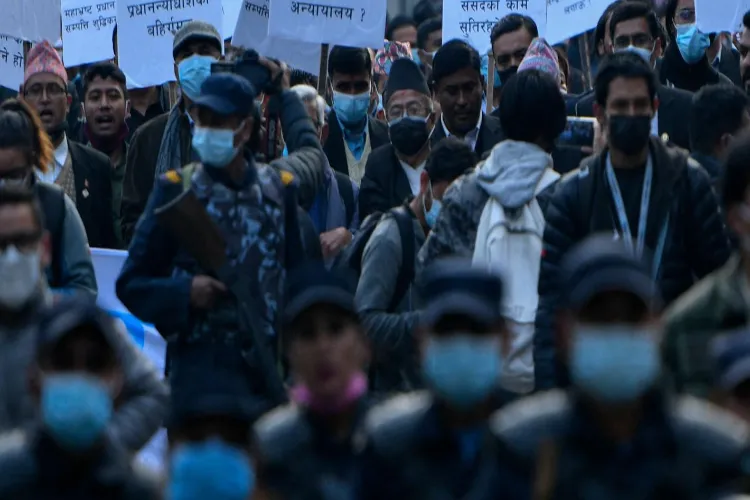
Kathmandu
Massive protests led by Generation Z demonstrators erupted in Kathmandu on Monday against corruption allegations against the government and the recent ban on several major social media platforms, The Kathmandu Post reported.
The protestors are vandalizing the parliament gate and police has fired dozens of rounds. Many people have been injured in the protests and casualties are expected.
According to The Kathmandu Post, the protests quickly turned violent, prompting authorities to extend a curfew across key parts of the capital.
What began as a peaceful march escalated when protesters broke through barricades and entered restricted zones near Parliament.
Police responded with water cannons, teargas, and rubber bullets after demonstrators threw tree branches and water bottles and shouted anti-government slogans, with some protesters reportedly managing to enter the Parliament compound, intensifying the situation.
In response to the unrest, the Kathmandu District Administration Office extended the curfew initially imposed in the capital's Baneshwar area. The new curfew now includes several high-security zones, such as the President's residence (Shital Niwas), the vice-president's residence in Lainchaur, Maharajgunj, all sides of Singha Durbar, the prime minister's residence in Baluwatar, and adjacent areas, as reported by The Kathmandu Post.
Chief District Officer Chhabilal Rijal issued the curfew order under Section 6 of the Local Administration Act and will remain in effect from 12:30 PM to 10:00 PM (local time).
The public has been strictly prohibited from movement, gatherings, protests, or encirclement activities within these zones.
According to The Kathmandu Post, protests come in the wake of the Nepal government's decision to ban 26 unregistered social media platforms, including widely used apps such as Facebook, Instagram, WhatsApp, YouTube, and Snapchat. The move has sparked public outrage, especially among young people, who accuse the government of stifling free expression while failing to address deep-seated corruption.
Meanwhile, two people were reportedly injured due to the rubber bullet fired by police to control the crowd, The Kathmandu Post reported.
In Kathmandu, Kantipur Television journalist Shyam Shrestha was hit by a rubber bullet while covering the demonstrations in Baneshwar. He is currently receiving treatment at Civil Hospital.
Meanwhile, another person was injured in Damak, the hometown of Nepal's Prime Minister KP Sharma Oli, after protests turned violent.
According to The Kathmandu Post, citing eyewitnesses, police opened fire when demonstrators attempted to storm the Damak Municipality office.
As the protests gained momentum, leading Nepali artists, actors, and entertainers voiced their support, further amplifying the movement.
Nepalese actor Hari Bansha Acharya posted on Facebook, saying, "Today's youth do more than just think--they ask questions. Why did this road collapse? Who is accountable? This is not a voice against the system but against those who misuse it."
He urged political leaders to take responsibility and prepare the next generation for leadership.
Madan Krishna Shrestha, another actor, echoed similar sentiments in a post on Facebook, stating, "Corruption has reached alarming levels, and even Mother Nepal seems to weep. Youth are the country's future, and their dreams mirror Nepal's. Years of stagnation have frustrated every citizen. This is today's Gen Z speaking. Their voices must be heard. Corrupt officials must be held accountable, leaders who understand citizens' needs, and the nation's aspirations realised."
Singer and actor Prakash Saput publicly supported the protestors by sending NRs 25,000 each to two brothers participating in the protests, advising them to stay hydrated and use the funds to help fellow demonstrators, The Kathmandu Post reported.
Rage against the Nepalese government erupted after it decided to shut down over two dozen social media platforms, which it claims is an effort to tax the revenue they generate in the country and to control content critical of the government.
Following the order from the government, social media sites went dark past midnight on September 4.
The government states that it took the action after issuing repeated warnings to the platforms to open offices in Nepal, following a Cabinet decision last month that set a deadline, as well as an August 17 Supreme Court ruling that also required them to register and pay the requisite taxes.
However, the Bill cited in the ban, 'The Operation, Use, and Regulation of Social Media in Nepal', has not yet been passed by Parliament. Some social media platforms, which were already paying taxes in Nepal despite not being officially registered, have also been blocked.
Currently, platforms such as Viber, TikTok, Wetalk and Nimbuzz are registered in Nepal, while Telegram and Global Diary are in the process. Widely used platforms like Facebook, Instagram and WhatsApp have yet to initiate registration.
Social media users calling themselves "Gen-Z" called for the nationwide protest today against the ban imposed by the government on social media.
READ MORE: Abdul Sattar scripting change through his Rabindra-Nazrul Academy
Earlier, Social media leaflets and posts had called for people to come to Baneshwor, near the federal parliament in the capital, to pressure the government to step back from its decision to shut down the social media platforms.
